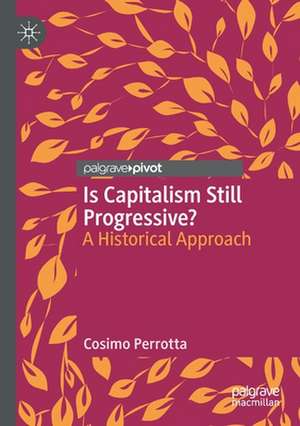Is Capitalism Still Progressive?: A Historical Approach
Autor Cosimo Perrottaen Limba Engleză Paperback – 2 aug 2021
Using economic history and the history of economic thought to inform debate, Is Capitalism Still Progressive?: A Historical Approach will be of interest to policy makers (especially in emerging countries), students and researchers interested in exploring the pros and cons, and persistence, of the capitalist system.
| Toate formatele și edițiile | Preț | Express |
|---|---|---|
| Paperback (1) | 380.45 lei 6-8 săpt. | |
| Springer International Publishing – 2 aug 2021 | 380.45 lei 6-8 săpt. | |
| Hardback (1) | 386.81 lei 6-8 săpt. | |
| Springer International Publishing – aug 2020 | 386.81 lei 6-8 săpt. |
Preț: 380.45 lei
Nou
Puncte Express: 571
Preț estimativ în valută:
72.80€ • 76.16$ • 60.47£
72.80€ • 76.16$ • 60.47£
Carte tipărită la comandă
Livrare economică 03-17 aprilie
Preluare comenzi: 021 569.72.76
Specificații
ISBN-13: 9783030481711
ISBN-10: 3030481719
Pagini: 159
Ilustrații: XV, 159 p.
Dimensiuni: 148 x 210 mm
Greutate: 0.24 kg
Ediția:1st ed. 2020
Editura: Springer International Publishing
Colecția Palgrave Pivot
Locul publicării:Cham, Switzerland
ISBN-10: 3030481719
Pagini: 159
Ilustrații: XV, 159 p.
Dimensiuni: 148 x 210 mm
Greutate: 0.24 kg
Ediția:1st ed. 2020
Editura: Springer International Publishing
Colecția Palgrave Pivot
Locul publicării:Cham, Switzerland
Cuprins
1: Capitalism creates progress.-2:The dark side of capitalism and its myths.-3:Capitalistic accumulation.-4:Plundering the world.-5: The welfare state and its crisis.-6: broken promises.- 7: The new challenges.-8: Labour-based development.- 9: Conclusions: Beyond the borders.
Recenzii
“In this valuable book Cosimo Perrotta investigates the nature, the history and the perspectives of capitalism on the basis of a rich set of historical data. … Perrotta offers a lucid, in-depth historical analysis of the large variety of forms in which capitalistic accumulation takes place.” (Mario Morroni, HEI History of Economic Ideas, Vol. 29 (2), 2021)
Notă biografică
Professor Cosimo Perrotta has been Council Chair of the European Society for the History of Economic Thought, published many articles in the main international journals of this discipline, among other monographs published Consumption as an Investment. The Fear of Goods from Hesiod to Adam Smith (2004) and Unproductive labour. History of an Idea (2018), Routledge.
Textul de pe ultima copertă
"In his wide-ranging analysis of the history and perspectives of capitalism, Cosimo Perrotta displays at their best the pessimism of the intellect and the optimism of the will. Capitalism is a difficult beast, with many different varieties: a humane, civil capitalism requires complex strategies of intervention, and Perrotta's proposals deserve our full attention."
- Alessandro Roncaglia, Professor of Economics, University of Roma “La Sapienza”
The economic crisis of 2007/2008 has prompted much debate as to what caused it and what remedies may be implemented in order to regain a healthy economy. This book addresses these issues through the lens of capitalism with a focus on labour economics, arguing that capitalism, and the employment of young people and migrants, may be a suitable antidote to the ongoing political crises in Europe that are taking place as a result of the economic crisis.
Using economic history and the history of economic thought to inform debate, Is Capitalism Still Progressive?: A Historical Approach will be of interest to policy makers, students and researchers interested in exploring the pros and cons, and persistence, of the capitalist system.
- Alessandro Roncaglia, Professor of Economics, University of Roma “La Sapienza”
The economic crisis of 2007/2008 has prompted much debate as to what caused it and what remedies may be implemented in order to regain a healthy economy. This book addresses these issues through the lens of capitalism with a focus on labour economics, arguing that capitalism, and the employment of young people and migrants, may be a suitable antidote to the ongoing political crises in Europe that are taking place as a result of the economic crisis.
Using economic history and the history of economic thought to inform debate, Is Capitalism Still Progressive?: A Historical Approach will be of interest to policy makers, students and researchers interested in exploring the pros and cons, and persistence, of the capitalist system.
Caracteristici
Addresses the causes and solutions to the present economic crisis Proposes restarting development through employment policy (not the reverse) Presents the unemployed of young and migrants workers as a solution, not a burden, to the economic crisis
